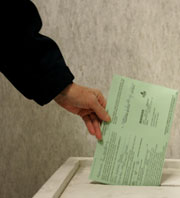Election 2008
Voting Rights: Release or Restrict?
Bill Radke
Millie Jefferson
MARCH 8, 2008
- A woman drops her ballot in a voter box .
- (J.D. Pooley/Getty Images)
- Enlarge This Image
Web Resources
Related Stories
- Sober Up and Fly Right
- Fighting to Throw the Race
- Mike Gravel, Still in the Running
- The YouTube Campaigners
More From Bill Radke
More From Millie Jefferson
Bill Radke: Mark, tell us about Mississippi specifically with respect to people with felony convictions voting.
Mark Mauer: Mississippi has a quirky system, where in 1890 the legislature identified crimes that would result in lifetime disenfranchisement. But rather than saying all felonies, they specifically identified crimes like murder, rape, bribery, theft and so on. They didn't include many other felonies or felonies that were not crimes at the time such as driving under the influence. Obviously they did not have cars then.
The question now in Mississippi is whether or not an estimated 12,000 of the 50,000 people in prison will be allowed to vote. The secretary of state is proposing that all felonies be included in this list. That way, anyone who has been convicted of a felony would be permanently disenfranchised. So if someone has served their full sentence and is now free, they still will be denied the right to vote.
A principle argument for restricting felons' voting rights is, "Why should people who break laws be allowed to help make laws?" What do you say to that?
When people come out of prison we know that we need to get them good jobs. We need to get them housing; we want them connected with positive institutions in the community. People who have a stake in the community are going to be less likely to victimize their neighbors. And if we can get people engaged in the electoral process that's affirmation of that connection with the community.
People who want to restrict felons' voting rights point out that we already take away the rights of felons. We take away their right to liberty by imprisoning them. Once they are out we sometimes restrict their movement for the safety of others and require them to check in and that taking away the right to vote is a punishment and a deterrent to crime.
Well, I think it's a distinction we need to make between the public safety consequences of a conviction and your fundamental rights of citizenship. We put people in prison because either they present a threat to the public or to punish them for their crime. But we don't normally take away your rights of citizenship. Even if you are sitting in a prison cell in a maximum security prison you can write a letter to the editor of the New York Times and you may get it published. You still maintain your right to freedom of speech in prison. You can own property while you are in prison and certainly, if you're out in the community and you are an ex-felon, you can do all that.
How much passion do you find among the felons you work with for the right to vote?
Well, there's actually quite a bit. Florida may be one of the best examples. In 2000, we had that historic election decided by 537 votes. And on the day of the election, there were some 600,000 ex-felons -- people who had completed their sentence -- and did not have the right to vote. And following that, there was a very well-organized campaign in this state to get the word out about the restoration process. And literally tens of thousands of people submitted petitions to the governor asking to have their rights restored. So, I think the hunger for participation is very much there, if we can make the process an accessible one.
So, now Mississippi is talking about more curtailing of felons rights. What signs, if any, are pointing in the opposite direction?
I don't anticipate that the issue of voting in prison is going to be on the political agenda anytime in the near future, but I think there has been tremendous momentum. Just in 2006, there was a ballot initiative in Rhode Island where voters were asked to restore voting rights to people on probation and parole. A majority of the public, in Rhode Island, endorsed that position. And so I think there is growing public support for reconsideration of these restrictions.
Mark, thanks so much for talking to us this weekend.
Thanks for having me.
-
- Music Bridge:
- Diagonal
- Artist: Richard Crandell
- CD: Wayfaring Strangers: Guitar Soli (Numero)







Comments
Comment | Refresh
Post a Comment: Please be civil, brief and relevant.
Email addresses are never displayed, but they are required to confirm your comments. All comments are moderated. Weekend America reserves the right to edit any comments on this site and to read them on the air if they are extra-interesting. Please read the Comment Guidelines before posting.
You must be 13 or over to submit information to American Public Media. The information entered into this form will not be used to send unsolicited email and will not be sold to a third party. For more information see Terms and Conditions and Privacy Policy.